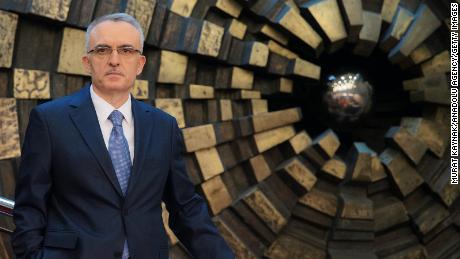UAE and Turkey hold rare high-level meeting. Here's why it matters

London/Istanbul (CNN Business)Turkey is plunging into a fresh currency crisis as investors dump the lira in response to the extraordinary decision by the country’s central bank to slash interest rates in the face of soaring inflation.
The lira stabilized on Wednesday but suffered a huge fall against the US dollar on Tuesday. The lira fell more than 15% against the dollar at one point. The Turkish currency has lost 40% of its value this year.
Tuesday’s plunge marked the 11th consecutive day of losses for the lira after the country’s central bank last week cut interest rates by 100 basis points. Rates have been slashed by 400 basis points, from 19% to 15%, since September. That’s despite inflation running at an annual rate of 20% in October.
Experts and opposition parties have accused President Recep Tayyip Erdogan of political interference by putting pressure on the central bank to lower rates.
The president has long championed the unorthodox view that rate cuts can fight rising inflation. Central banks typically raise interest rates when inflation is soaring to stop the economy from overheating.
“We think the pressures will only subside after a change in policy and the key question is whether this will be in a more orthodox or unorthodox direction,” Goldman Sachs strategists Murat Unur and Clemens Grafe wrote in a research note Tuesday.
But Erdogan shows no signs of backing down. In an address earlier this week, he defended his government’s monetary policy, describing it as a “war of independence” that Turkey will win. Lower interest rates, he argued, would reduce inflation and boost production and exports.
“Nobody should have any doubt that the way to increase employment, which is our priority in our country, is through investment, production, export and growth,” Erdogan tweeted on Monday evening.
The lira’s volatility led Apple (AAPL) to temporarily halt online sales in Turkey on Tuesday. The currency’s crash makes it more expensive for residents to purchase goods imported from abroad.
In a statement, the central bank said exchange rates “are determined by free market dynamics” and the sell-off was “unrealistic and completely detached” from economic fundamentals.
Opposition parties have been calling for early elections, criticizing the government’s influence over central bank policy.
“Mr. Erdogan is speaking, the dollar is rising. Mr. Erdogan is speaking, inflation is increasing. Mr. Erdogan is speaking, our nation is getting poorer,” leader of the opposition Iyi Party Meral Aksener said Wednesday. “Whatever you say, whatever lies you make up, the truth is obvious.”
The turmoil resulted in some small protests in the capital Ankara and Istanbul.
Abu Dhabi Crown Prince Sheikh Mohamed bin Zayed, who is the de facto leader of the United Arab Emirates, arrived in Ankara on Wednesday for talks with Erdogan after years of strained ties.
Following the talks, the UAE announced a $10 billion investment fund to support the Turkish economy and boost bilateral cooperation between the two countries, Abu Dhabi Development Holding CEO Mohamed Hassan Alsuwaidi said at a press conference in Ankara.
— CNN’s Kareem Khadder in Jerusalem contributed to this article.
Source: Read Full Article

